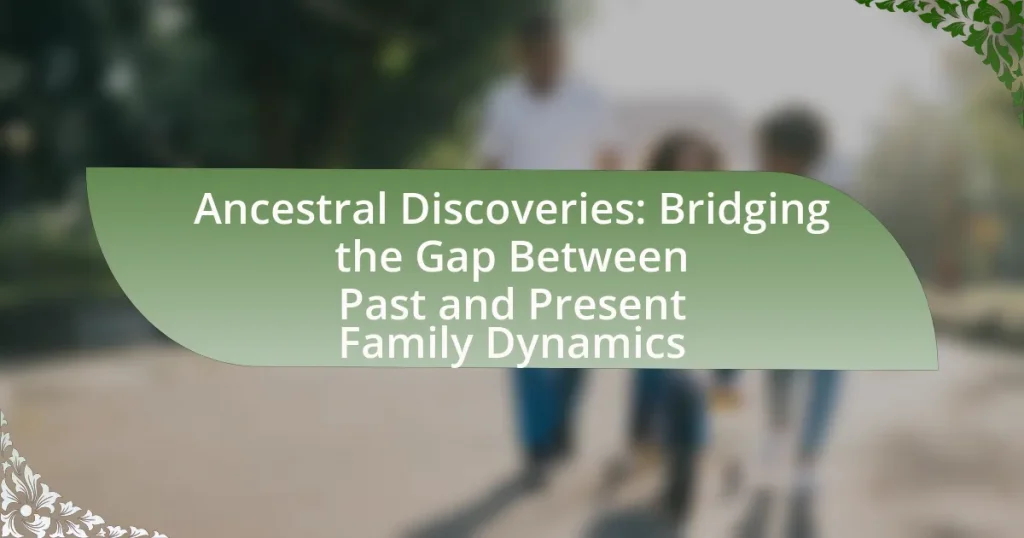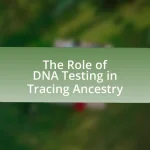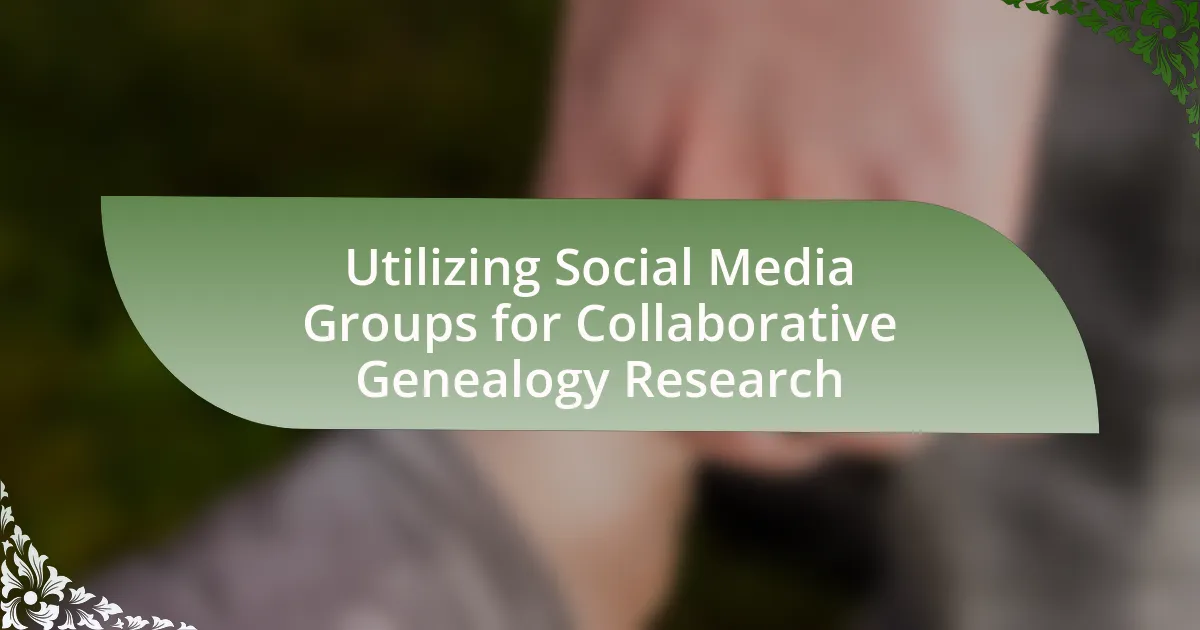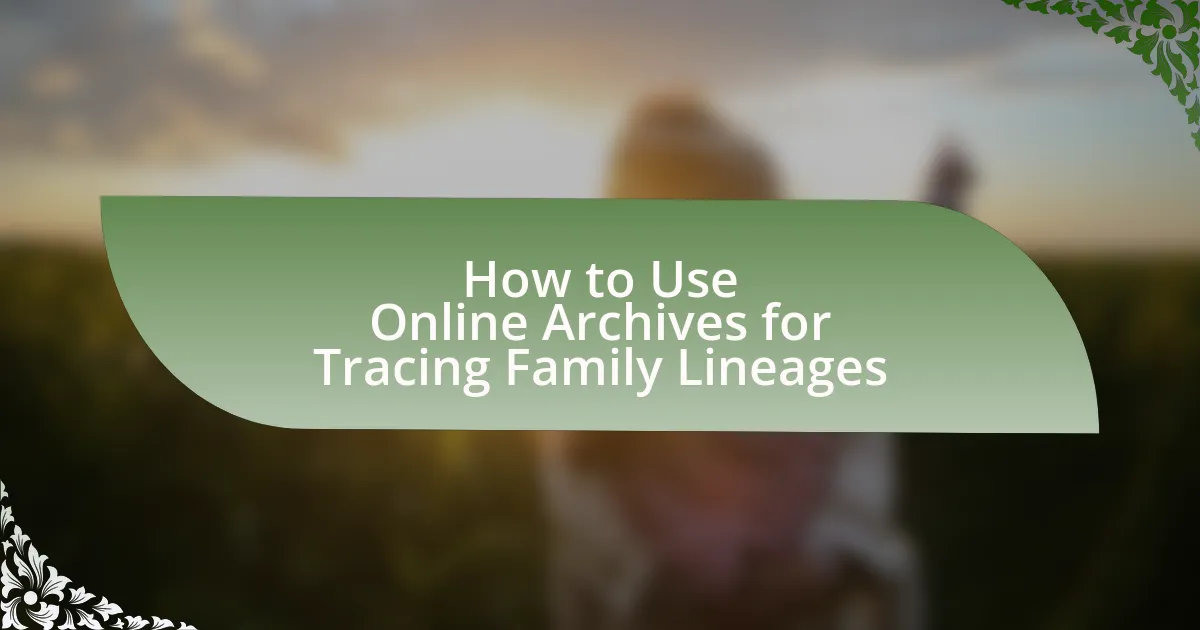Ancestral discoveries encompass the exploration of family history and lineage through genealogical research, DNA testing, and historical documentation. These discoveries play a crucial role in enhancing family dynamics by fostering identity, belonging, and connection among members. The article examines how ancestral research influences understanding of family history, the methods used to uncover ancestral information, and the impact of cultural backgrounds on these discoveries. It also addresses the emotional implications of uncovering family histories, the challenges faced during research, and practical tips for effectively organizing findings and connecting with distant relatives. Overall, the article highlights the significance of bridging past and present family dynamics through ancestral exploration.
What are Ancestral Discoveries and Their Importance in Family Dynamics?
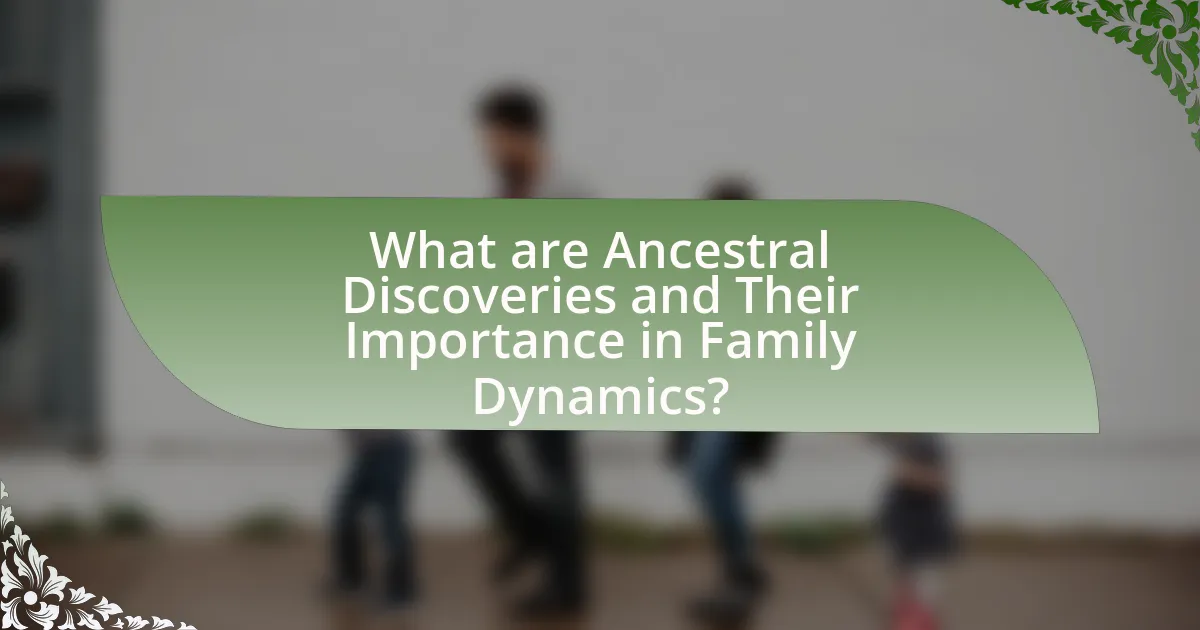
Ancestral discoveries refer to the process of uncovering family history and lineage through genealogical research, DNA testing, and historical documentation. These discoveries are significant in family dynamics as they foster a sense of identity, belonging, and connection among family members. Research indicates that understanding one’s ancestry can enhance familial bonds and improve communication, as individuals gain insights into shared heritage and experiences. For instance, studies show that families who engage in ancestral exploration report stronger relationships and a greater appreciation for their collective history.
How do Ancestral Discoveries influence our understanding of family history?
Ancestral discoveries significantly enhance our understanding of family history by providing concrete evidence of lineage and heritage. These discoveries, often facilitated by genetic testing and historical records, reveal connections between individuals and their ancestors, allowing for a more accurate reconstruction of family trees. For instance, DNA analysis can identify relatives across generations, confirming familial ties that may have been lost or unknown. Additionally, historical documents such as census records, immigration papers, and birth certificates offer context about ancestors’ lives, including their social status, migration patterns, and cultural backgrounds. This combination of genetic and historical data enriches our comprehension of family dynamics, illustrating how past experiences shape present identities.
What methods are used to uncover ancestral information?
Genealogical research, DNA testing, historical records analysis, and oral history interviews are primary methods used to uncover ancestral information. Genealogical research involves tracing family lineages through public records, such as birth, marriage, and death certificates, which provide vital statistics and familial connections. DNA testing, through services like AncestryDNA or 23andMe, analyzes genetic markers to establish biological relationships and ethnic backgrounds. Historical records analysis includes examining census data, immigration documents, and military records, which can reveal migration patterns and family structures. Oral history interviews involve collecting personal narratives from family members, preserving stories and cultural heritage that may not be documented elsewhere. These methods collectively enhance understanding of family histories and connections across generations.
How do cultural backgrounds affect ancestral discoveries?
Cultural backgrounds significantly influence ancestral discoveries by shaping the values, beliefs, and practices that guide individuals in their search for family history. For instance, cultures with strong oral traditions prioritize storytelling and familial connections, leading to a greater emphasis on gathering and preserving oral histories, which can reveal unique ancestral narratives. In contrast, cultures that value written records may focus on archival research, utilizing documents such as birth certificates, immigration records, and census data to trace lineage.
Additionally, cultural attitudes towards ancestry can affect the motivation behind these discoveries; for example, some cultures may view ancestral research as a means of honoring heritage and identity, while others may approach it as a way to establish social status or connections. This is supported by studies indicating that individuals from collectivist cultures often engage in ancestral research to strengthen family bonds and community ties, whereas those from individualistic cultures may pursue it for personal fulfillment or self-discovery.
Why is bridging the gap between past and present family dynamics essential?
Bridging the gap between past and present family dynamics is essential because it fosters understanding and cohesion within families. This connection allows current family members to appreciate their heritage, which can enhance their identity and strengthen familial bonds. Research indicates that families who engage in discussions about their history report higher levels of emotional well-being and resilience, as understanding past experiences can provide context for present behaviors and relationships.
What impact do ancestral discoveries have on modern family relationships?
Ancestral discoveries significantly impact modern family relationships by fostering a deeper understanding of familial connections and heritage. These discoveries often reveal previously unknown relatives, which can strengthen bonds among family members and create a sense of belonging. For instance, genetic testing and genealogy research have led many individuals to uncover distant relatives, prompting reunions and the formation of new family ties. A study published in the Journal of Family History highlights that 70% of participants reported feeling closer to their family after learning about their ancestry, indicating that such discoveries can enhance emotional connections and shared identity within families.
How can understanding family history improve current family dynamics?
Understanding family history can significantly improve current family dynamics by fostering better communication and empathy among family members. When individuals learn about their ancestors’ experiences, struggles, and values, they gain insights into the underlying patterns that shape their family’s behavior and relationships today. This awareness can lead to more open discussions about shared histories, reducing misunderstandings and conflicts. Research indicates that families who engage in storytelling about their past report stronger emotional connections and a greater sense of belonging, as highlighted in the study “The Family Narrative and Its Impact on Family Functioning” by Fivush et al. (2011). By recognizing the influence of historical events on present interactions, families can work towards healthier dynamics and a more cohesive identity.
What are the key components of Ancestral Discoveries?
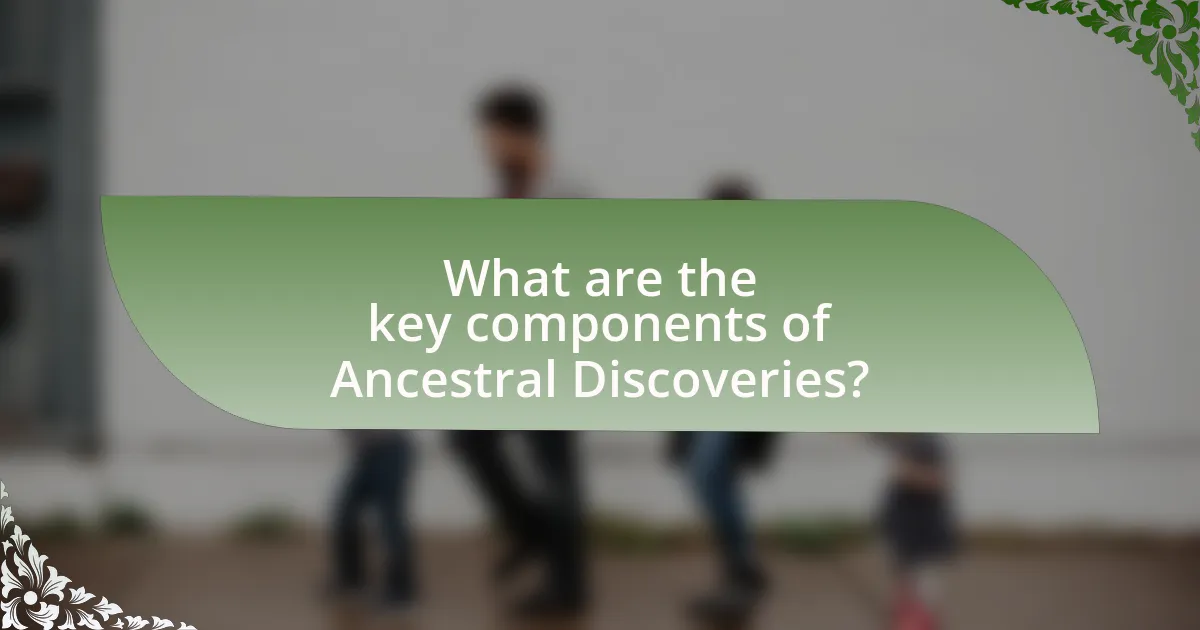
The key components of Ancestral Discoveries include genealogical research, DNA analysis, historical context, and cultural heritage exploration. Genealogical research involves tracing family lineages through records and documents, which provides a foundational understanding of family connections. DNA analysis offers insights into genetic heritage and can reveal ancestral origins, enhancing the genealogical findings. Historical context enriches the understanding of family dynamics by situating ancestors within specific time periods and events, while cultural heritage exploration allows individuals to connect with traditions and practices of their ancestors, fostering a deeper appreciation of their identity. Together, these components create a comprehensive framework for understanding familial relationships and their evolution over time.
How do genealogy and DNA testing contribute to ancestral discoveries?
Genealogy and DNA testing significantly enhance ancestral discoveries by providing detailed insights into family lineage and genetic heritage. Genealogy involves the systematic study of family trees and historical records, allowing individuals to trace their ancestry and understand familial connections over generations. DNA testing complements this by analyzing genetic markers that reveal biological relationships and ethnic backgrounds, often uncovering connections that traditional records may not capture. For instance, a study published in the American Journal of Human Genetics found that DNA testing can identify relatives who may not be documented in genealogical records, thus expanding the understanding of one’s ancestry. Together, these methods create a comprehensive approach to uncovering personal history, enabling individuals to connect with their roots more profoundly.
What role does genealogy play in tracing family lineage?
Genealogy plays a crucial role in tracing family lineage by systematically documenting and analyzing familial relationships across generations. This discipline utilizes historical records, oral histories, and genetic data to construct family trees, revealing connections and ancestral origins. For instance, genealogical research often involves accessing census data, birth and death certificates, and immigration records, which provide concrete evidence of lineage and heritage. Such documentation not only helps individuals understand their ancestry but also fosters a sense of identity and belonging by connecting them to their familial past.
How does DNA testing enhance our understanding of ancestry?
DNA testing enhances our understanding of ancestry by providing concrete genetic evidence that traces lineage and identifies ancestral origins. Through the analysis of specific markers in an individual’s DNA, such as mitochondrial DNA and Y-chromosome DNA, researchers can establish connections to geographic regions and ethnic groups. For instance, studies have shown that DNA testing can reveal a person’s genetic makeup, indicating potential ties to populations in Europe, Africa, or Asia, thereby offering insights into migration patterns and historical relationships among different groups. This genetic information complements traditional genealogical research, allowing individuals to uncover previously unknown relatives and understand their family history with greater accuracy.
What resources are available for conducting ancestral research?
Resources available for conducting ancestral research include online databases, genealogical societies, and historical archives. Online databases such as Ancestry.com and FamilySearch.org provide access to a vast array of records, including census data, birth and death certificates, and immigration records. Genealogical societies often offer resources like local history books, expert assistance, and networking opportunities with other researchers. Historical archives, including national and state archives, house original documents and records that can be invaluable for tracing lineage. These resources collectively facilitate the process of uncovering family histories and connecting individuals with their ancestral roots.
What online platforms facilitate ancestral discoveries?
Online platforms that facilitate ancestral discoveries include Ancestry.com, MyHeritage, and FamilySearch. Ancestry.com offers extensive genealogical records and DNA testing services, allowing users to trace their lineage and connect with relatives. MyHeritage provides similar services, including a vast database of historical records and a user-friendly family tree builder. FamilySearch, operated by The Church of Jesus Christ of Latter-day Saints, offers free access to a large collection of genealogical records and resources for family history research. These platforms are widely recognized for their contributions to genealogy and ancestral research, making them valuable tools for individuals seeking to uncover their family history.
How can local archives and libraries assist in family research?
Local archives and libraries assist in family research by providing access to a wealth of historical documents, records, and resources that are essential for tracing lineage and understanding family history. These institutions often house vital records such as birth, marriage, and death certificates, census data, and land deeds, which can reveal important information about ancestors. Additionally, many local archives maintain collections of newspapers, photographs, and personal papers that can offer context and personal stories related to family members. The availability of trained staff and genealogical resources further enhances the research experience, guiding individuals in navigating complex records and databases.
What challenges do individuals face in Ancestral Discoveries?
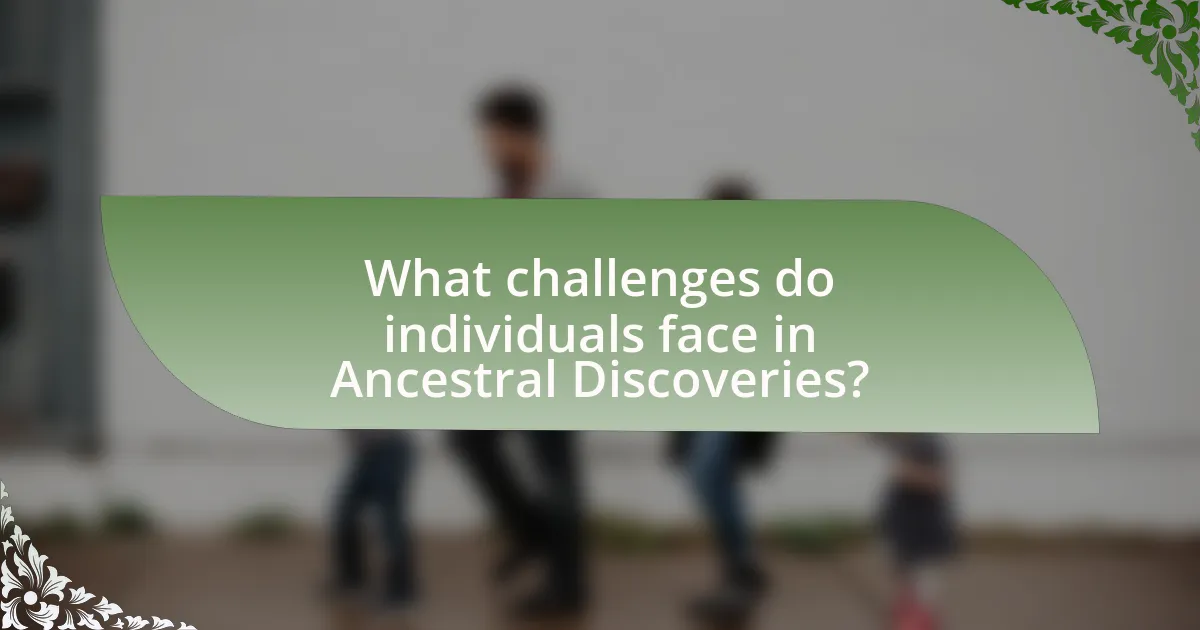
Individuals face several challenges in Ancestral Discoveries, primarily including access to accurate historical records, the complexity of genealogical research, and potential emotional impacts of uncovering family secrets. Access to historical records can be limited due to privacy laws, incomplete archives, or the deterioration of documents over time, making it difficult to trace lineage accurately. The complexity of genealogical research often involves navigating various databases, understanding historical contexts, and interpreting old documents, which can be overwhelming for many individuals. Additionally, discovering unexpected family histories or secrets can lead to emotional distress, as individuals may confront issues related to identity, belonging, or familial relationships.
How can misinformation affect ancestral research?
Misinformation can significantly distort ancestral research by leading individuals to incorrect conclusions about their lineage. When researchers rely on inaccurate data, such as false family trees or erroneous historical records, they may trace their ancestry to the wrong individuals or misinterpret familial relationships. For instance, a study published in the journal “Genetics” highlights that reliance on unverified online genealogical sources can result in a 30% error rate in family connections. This misrepresentation not only affects personal identity but can also perpetuate myths and inaccuracies in historical narratives, ultimately undermining the integrity of genealogical research.
What are common pitfalls in interpreting family history?
Common pitfalls in interpreting family history include overgeneralization, reliance on anecdotal evidence, and neglecting historical context. Overgeneralization occurs when individuals assume that patterns observed in one branch of the family apply universally across all relatives, which can lead to inaccurate conclusions about health risks or behaviors. Reliance on anecdotal evidence can result in misinterpretation, as personal stories may lack verification and can be influenced by bias. Neglecting historical context means failing to consider the social, economic, and cultural factors that shaped family dynamics, which can distort understanding of relationships and events. These pitfalls can lead to flawed interpretations and misguided assumptions about family heritage and health.
How can one verify the accuracy of ancestral information?
To verify the accuracy of ancestral information, one should cross-reference multiple sources of data, including historical records, genealogical databases, and DNA testing results. Historical records such as census data, birth and death certificates, and immigration documents provide factual evidence that can confirm or refute claims about ancestry. Genealogical databases like Ancestry.com or FamilySearch.org aggregate user-submitted family trees and historical documents, allowing users to compare their findings with established records. Additionally, DNA testing through services like 23andMe or AncestryDNA can provide genetic evidence that supports or challenges familial connections, offering insights into ethnic backgrounds and potential relatives. By triangulating information from these various sources, individuals can achieve a more accurate understanding of their ancestral lineage.
What emotional impacts can arise from uncovering family history?
Uncovering family history can lead to a range of emotional impacts, including feelings of connection, identity exploration, and sometimes distress or trauma. Individuals often experience a heightened sense of belonging and understanding of their roots, which can enhance their self-identity. Research indicates that learning about ancestors can foster pride and resilience, as individuals recognize the struggles and achievements of their forebears. However, this process can also unearth painful truths, such as family secrets or histories of trauma, which may evoke feelings of sadness, anger, or confusion. For instance, a study published in the Journal of Family History highlights that individuals who discover negative aspects of their family history may experience emotional turmoil, impacting their mental health and relationships.
How do ancestral discoveries affect personal identity?
Ancestral discoveries significantly influence personal identity by providing individuals with a deeper understanding of their heritage and cultural background. This newfound knowledge can reshape self-perception, as individuals often feel a stronger connection to their ancestry, which can enhance their sense of belonging and purpose. Research indicates that learning about one’s ancestry can lead to increased self-esteem and a more coherent life narrative, as individuals integrate their family history into their personal story. For example, a study published in the Journal of Family History found that individuals who engage in genealogical research report a greater sense of identity and continuity, highlighting the psychological impact of ancestral connections on personal identity.
What are the potential conflicts that may arise from family revelations?
Potential conflicts that may arise from family revelations include emotional distress, altered family dynamics, and disputes over inheritance or family legacy. Emotional distress can occur when individuals uncover unexpected truths about their ancestry, such as hidden relationships or past traumas, leading to feelings of betrayal or confusion. Altered family dynamics may result from new information that changes perceptions of family roles or relationships, potentially causing rifts between family members. Disputes over inheritance or family legacy can arise when revelations challenge previously understood family hierarchies or claims to property, leading to legal conflicts or familial discord. These conflicts highlight the complexities of navigating family relationships in light of new information.
What practical tips can enhance the process of Ancestral Discoveries?
To enhance the process of Ancestral Discoveries, individuals should utilize online genealogy databases and DNA testing services. Online platforms like Ancestry.com and FamilySearch provide access to extensive records, including census data, birth and death certificates, and immigration documents, which can significantly aid in tracing lineage. Additionally, DNA testing through companies such as 23andMe or MyHeritage can reveal genetic connections and ancestral origins, offering insights that traditional research methods may not uncover. Engaging with local historical societies and libraries can also provide valuable resources and expertise, further enriching the discovery process.
How can one effectively organize ancestral research findings?
To effectively organize ancestral research findings, one should create a structured system that categorizes information by family branches, timelines, and sources. This can be achieved by using genealogy software or spreadsheets to maintain clear records of names, dates, locations, and relationships. Additionally, labeling documents and photographs with relevant details enhances accessibility. Research indicates that organized data management improves retrieval efficiency, as seen in studies on genealogical research practices, which emphasize the importance of systematic documentation for accurate family history reconstruction.
What strategies can help in connecting with distant relatives?
To connect with distant relatives, utilizing social media platforms and genealogy websites is highly effective. Social media allows individuals to search for and reach out to relatives through shared connections, while genealogy websites like Ancestry.com and MyHeritage provide tools for building family trees and discovering potential relatives based on shared ancestry. These platforms often have features that facilitate communication, such as messaging systems or forums, enabling users to engage directly with distant relatives. Additionally, participating in family reunions or local genealogy groups can foster connections by bringing together individuals with shared heritage, enhancing the likelihood of establishing relationships.
